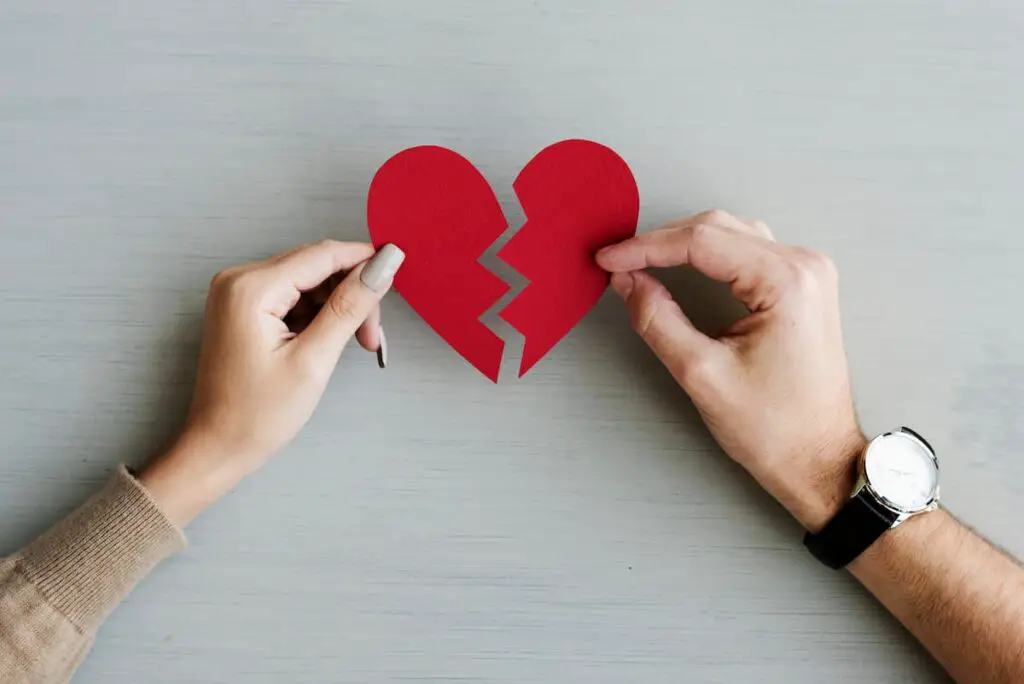No matter the circumstance, a breakup is always hard. And for the one who got dumped, we will always be wondering whether it’s a temporary break or permanent. If that sounds familiar, you may have asked “how do I know if my breakup is final?”
Here are some of the tell-tale signs that your breakup is likely to be a permanent one:
- You are no longer physically attracted to your ex.
- The emotional connection is gone.
- You feel better about yourself without your ex.
- You don’t trust each other anymore.
- Your values and goals in life no longer match.
- You or your ex has moved on with someone else.
- You are physically distant from each other.
- Your relationship has suffered irreparable damage.
But those are just a few of my 19 unmistakable signs!
If you’re wondering where your breakup stands, let’s take a better look at each of these signs to help you figure out whether you’re ready for completely new romantic relationships or whether you just need a bit of space before getting back together with your ex. Sometimes temporary breaks are a good thing.
But often it’s a clear indication that this romantic partner isn’t right for you.
So here are my . . .
19 Unmistakable Signs Your Breakup Is Final
1. You Are No Longer Physically Attracted to Your Ex
When you’re head over heels in love with someone, you crave their presence, enjoy their attention, and love to be close. You love everything about them–even their flaws–and you find them irresistibly attractive.
But when the spark isn’t there anymore, their quirks and physical flaws get magnified, and you are no longer as interested in them or drawn to them as you used to be. Suddenly, they’re not as handsome or beautiful as you thought they were.
You may even find yourself wondering what you liked about them in the first place, and struggle to really relate to the good times you shared!
But what’s usually the biggest sign that this is happening is there is very little attraction or desire between the two of you. If the mere thought of being close to your ex or your ex touching you is eliciting feelings of disgust or zero interest at the very least, chances are there’s no way you’re getting back together. (If your ex is having these feelings, your relationship is also likely over, even if you aren’t there yet.)
Intimacy is important to keep the bond between two people strong in a relationship. And so when that’s not happening or can’t happen, there’s no spark that can ignite what could possibly be a restart in the relationship.
Plus, if the loss of interest or physical attraction has begun even before you broke up, you most likely did not have a healthy or loving relationship in the first place, or at least, not around the time you ended things. In that case, there’s hardly anything to keep the fire going.
Besides, for any relationship to work at all, you have to like the person enough to be with them.

2. The Emotional Connection Is Gone
A relationship is not all about the physical.
Though physical attraction may be where relationships start, a healthy, long-term relationship depends on more. A relationship grows when you feel that you are understood and safe when you can be vulnerable and not ashamed of your thoughts and feelings.
However, that doesn’t mean that you’ll be so in sync that you don’t fight at all. In fact, fighting (to an extent) is normal in a healthy relationship, because you’re two different people with different upbringings and from different backgrounds coming together.
Unfortunately, when you are no longer emotionally connected with someone, or feel emotional pain regarding them, you will care less and less about them. You will find yourself getting more and more unaffected by what they say or do. You no longer get angry with them about their past mistakes, nor do you get frustrated anymore by what could have been–if only you or your ex did better.
It’s common for exes, especially in the early stages of the breakup, to still keep in touch. Sometimes, exes may even continue to fight. That’s because they’re still emotionally affected by each other–what the other person does still matters.
Often, when the breakup is final, you no longer feel the need to keep in contact.
You may no longer see your ex as the one person with whom you can bare your heart and soul. You may see them in the office or at a coffee shop and be able to feel no resentment or sadness or affection. You may even afford to smile or say hi without the memories of the past feeling like a weight on your chest.
3. You Feel Better About Yourself Without Your Ex
Another sign that your breakup could be permanent is if you feel better about yourself now that your ex is no longer in your life. This is often true when the relationship was toxic or abusive because then the breakup becomes freedom from what felt like a trap.
This also often means that you have emotionally checked out from the relationship and realize that you actually gained from losing your ex.
Those who have gone through emotional abuse or manipulation may struggle emotionally with the breakup, especially if the manipulation has been deeply ingrained.
But deep down, they will understand that they are in a better place now that they have broken up with their ex. Because with it comes the freedom to express themselves in ways that they have never felt free to do so before, discover new things about themselves, or see how strong they are on their own.
If your ex was abusive (or if you’re in an abusive relationship and are thinking of breaking up), don’t be afraid to reach out to professionals who can help you cope with the trauma.
No matter how wild you think your story may be, you are not alone.
Even for those who did not go through abuse from their ex, breaking up may still feel like a personal triumph. And when that’s the case, who would want to go back to what was? If you’re much happier now than you were when you were a couple, chances are slim that you’re getting back together.
4. You Don’t Trust Each Other Anymore
Trust is vital in a healthy relationship. So if you broke up because you or your ex has been having trust issues, it’s probably safe to say you’re not getting back together. That’s because trust is incredibly hard to regain once it’s been broken.
Some examples of the worst things that lead to trust issues:
- Having an affair
- Habitually breaking promises
- Habitual lying
Although rebuilding trust is an uphill climb, it’s still possible.
That’s especially true if you can see that the other person is consistently working to better themselves, change their habits, or deliberately avoid places or things that may tempt them to do something they shouldn’t.
There’s much hard work involved, and it starts with identifying exactly what caused the breakdown of trust.
However, if the guilty party is not doing any of that or, worse, not owning up to the fact that they’re part of the problem, it’s impossible to even think of trusting them again. Imagine getting back together with someone you can’t rely on to have your back, or whose words you constantly have to check because you’re afraid they’re lying or cheating.
How exhausting is that!?
But even if the guilty party is actively doing the work needed to rebuild trust, it doesn’t necessarily mean they will be successful. It depends on the gravity of the problem and how it has affected the other person.
Therefore, if your ex doesn’t take your words at face value anymore, doubts everything you do, or is not interested in speaking again, it’s best to simply accept that the relationship is lost, and the breakup is final.
5. Your Values and Goals in Life No Longer Match
What we often see among strong couples is that they have common goals and values. They have a clear direction for life that complements or matches each other’s. It’s hard to be with someone who doesn’t agree with the principles that guide what you do, how you do it, and why.
People often gloss over this fact when the relationship is new and they are looking at their partner with rose-colored glasses. However, when the haze of new love has faded and reality sets in, that’s when the rubber hits the road. “Real world” issues that can trigger these conversations include:
- Whether you plan to get married or not
- What religion you follow
- How you’re going to spend your money
- Who pays for what
- Whether you want kids
Unfortunately, you can’t sustain a relationship just because you are attracted to each other or you’re in love. It’s impossible to be in a long-term relationship when you are always going in different directions or going against one another’s values.
Eventually, when such a situation forces a relationship to fall apart, either one or both parties will see the relationship as a roadblock to the kind of life that they want or to their personal goals. Instead of having someone supporting you, you’ll have an antagonist instead.
Sometimes, someone will be willing to change their goals or adopt the values of the other person, but this is often the exception to the rule. (Also, it usually backfires and does not last.) However, if you broke up and your ex is continuing to pursue a different direction from yours, you can count on them continuing on that course without you.

6. You or Your Ex Has Moved On With Someone Else
One of the saddest things about breaking up is when you haven’t yet moved on but your ex is already in a relationship with someone new. Painful though it is, it’s a clear sign that you should stop yourself from imagining that you’ll get back together.
Regardless of how you feel, your ex is now invested in another relationship.
To help you cope, try to cut all your connections with your ex. This will help sink in the fact that they are no longer part of your life. Keeping communications open with your ex will only make it harder for you to move on.
You can block your ex on social media or delete them from your contacts list. If you work in the same office or live nearby, try to arrange to be transferred to a different office or find ways to avoid running into one another too often. However, don’t stop there.
You should also foster other meaningful relationships, such as with family and close friends. By doing so, you’ll find that you’re actually not as alone as you think you are. You don’t have to be in a new relationship to feel better about yourself or to move on.
Just be open to the possibility when it does eventually arise.
7. You Are Physically Distant From Each Other
When there is a significant physical distance between you and your ex, it will be harder to connect meaningfully. If you’re in different time zones, for example, there is a very small possibility of communication, and life without each other can easily become the norm.
If one of you has decided to move after the breakup, that’s a sign that they are serious about the break and are less likely to consider getting back together.
Long-distance relationships can work, although they’re much more difficult. But when you physically distance yourself during a rough patch or after a breakup, you may essentially be closing the door on the relationship, because no good communication can happen when you are miles away from each other.
Sure, technology can help. But FaceTime is no substitute for a good, long (perhaps tearful) talk in person.
And if, aside from the physical distance, your ex is not showing signs of willingness to communicate with you (such as if they’re not responding to your messages), you should take it to mean that as far as they’re concerned, you’re no longer in the picture.

8. Your Relationship Has Suffered Irreparable Damage
Lastly, if your relationship has suffered irreparable damage, it may well be a chapter that has ended. Some examples of irreparable damage include:
- Serious and devastating financial issues
- Sexual or physical abuse
- Ruined relationships with family and friends
When there has been significant damage to the relationship, it’s hard to bounce back to normal.
9. Your Ex is Toxic
It can be difficult to decide whether or not to try and reconcile with a toxic ex.
On one hand, it may be possible to repair the relationship and move forward in a healthier way. On the other hand, it may be best to accept that the relationship is over and move on.
Ultimately, it is important to consider your own feelings, negative emotions, and safety when making this decision.
If you feel that you can handle the situation without putting yourself in danger, then it may be worth trying to reconcile. However, if you feel that the situation is too toxic or dangerous, then it may be best to end the relationship for good.
10. You or Your Ex Habitually Cheated
Reconciling with someone who cheated on a regular basis can be a difficult decision to make. Aftter all, while it’s not always true that “once a cheater, always a cheater”, there is often no better predictor of future behavior than past behavior.
Unless the person has taken active steps to change their behavior.
It is important to consider the implications of continuing the relationship and whether it is worth the risk. I certainly would not reconcile with them if they haven’t taken any steps to work on their mental health and the reasons behind the cheating (which have nothing to do with you).
If you decide to try and reconcile, it is important to set boundaries and expectations for the future.
This includes being clear about what behaviors are acceptable and unacceptable, as well as discussing how you will handle any future infidelities. It is also important to be honest with yourself about your own feelings and motivations for wanting to reconcile.
If you are not ready or willing to forgive, it may be best to move on from the relationship. If you habitually cheated, then clearly there are issues you need to work on with a therapist before you get into any relationship with anyone.
11. You Broke Up 3 or More Times
Reconciling after multiple breakups can be a difficult decision to make.
It is important to consider the reasons why the ending of a relationship happened in the first place and if those issues have been resolved. If the same issues keep coming up, it may be best to move on and find a healthier relationship.
On the other hand, if both parties are willing to work on their issues and make changes, then reconciliation may be possible. It is important to communicate openly and honestly about what each person needs from the relationship in order for it to work. If both parties are willing to put in the effort, then reconciliation may be worth trying.
Ultimately, it is up to each individual to decide if they want to try and reconcile after multiple breakups or move on with their lives.
12. They Constantly Sent Mixed Messages
It can be difficult to reconcile with someone who often sends mixed messages.
It is important to remember that it is not your fault if someone is sending you confusing signals. It is also important to remember that it is not your responsibility to try and fix the situation. If you decide to try and reconcile with this person, it is important to set boundaries and communicate clearly about what you need from them.
Be sure to listen carefully and be honest about your feelings. If the person continues to send mixed messages, it may be best to distance yourself from them in order to protect your own mental health.
13. They Constantly Violated Your Boundaries
You should not try and reconcile with someone who often violated your boundaries.
It is important to recognize when someone is not respecting your boundaries and to take steps to protect yourself. Trying to reconcile with someone who has repeatedly violated your boundaries can be dangerous and can lead to further violations. It is important to remember that you have the right to set boundaries and that it is okay to say no.
If someone continues to violate your boundaries, it is best to distance yourself from them and the negative experience and seek help from a best friend or professional.
14. They Never Apologize for Their Mistakes
You should not try and reconcile with someone who rarely or never apologizes for their mistakes.
It is important to have a relationship built on mutual respect and understanding. If someone is unwilling to take responsibility for their actions, it can be difficult to build a healthy relationship. Furthermore, it can be emotionally draining to constantly be in a situation where you are trying to make amends without any reciprocation.
It is better to focus on relationships with people who are willing to take responsibility for their mistakes and apologize when necessary. This will create a healthier environment for both parties involved.
15. They Love Drama and/or Making You Jealous
It is not worth trying to reconcile with someone who creates unnecessary drama or likes to make you jealous.
This type of behavior is toxic and can be damaging to your mental health. It is best to distance yourself from this person and focus on your own well-being. Trying to fix the relationship will only lead to more stress and frustration.
It is important to remember that you are not responsible for someone else’s behavior and that it is okay to take care of yourself first. If the person truly wants a reconciliation, they should be willing to put in the effort and show genuine remorse for their actions.

16. You Often Felt Insecure Around Them
You should not try and reconcile with someone who always made you feel insecure.
It is important to remember that your mental health and well-being should always come first. If someone has caused you to feel insecure in the past, it is likely that they will continue to do so in the future. It is best to distance yourself from them and focus on building relationships with people who make you feel safe and secure.
Feeling insecure and anxious is a clear sign of an unhealthy emotional attachment.
If someone has made you feel insecure in the past, it is likely that they will continue to do so if you try and reconcile with them. It is best for both parties involved if you distance yourself from them and focus on building relationships with people who make you feel secure and supported.
But I will also add that no one can make you feel anything. So if you struggle with insecurity, working with a great therapist can do wonders.
17. They Don’t Take Any Steps to Work on Themselves
It can be difficult to reconcile with someone who doesn’t want to work on their childhood issues and relationship baggage.
It is important to remember that it is ultimately up to them to decide if they want to work on these issues. If they are not ready or willing, it may be best to respect their wishes and focus on your own healing.
It is also important to remember that you cannot force someone else to change or heal, no matter how much you care about them. You can offer support and understanding, but ultimately the decision must come from them. If they are not ready, it may be best to focus on your own healing journey and let go of any expectations for reconciliation.
18. You Always Felt Like a Backup Plan
You should not try and reconcile with someone who always treated you like a backup plan and never fully committed themselves to you.
It is important to recognize when someone is not treating you with the respect and commitment that you deserve. Trying to reconcile with them will only lead to further disappointment and hurt. It is better to focus on yourself and find someone who will treat you the way that you deserve.
So go no contact and move on with your life. If you were indeed low on their priority list, you likely won’t hear from them anyway. With the no contact rule, you don’t contact them for any reason, including liking or commenting on social media.
It can be difficult to let go of someone who has been in your life for a long time, but it is important to remember that it is not healthy for either of you if they are not fully committed. You should focus on finding your next serious relationship who will give you the respect and commitment that you need in a relationship.
This person will be worth the wait and will make all of your efforts worthwhile.
19. Your Friends and Family Never Liked Them
It is important to remember that your friends and family are likely looking out for your best interests.
A friend or family member may have seen something in the person that you did not, or they may have had a bad experience with them in the past. It is important to take their opinion into consideration before making any decisions.
Also understand that if you do reconcile, it can make things more difficult in the future when spending time with family and friends due to the obvious tension it will create. And if mutual friends still caution you against trying to get your ex back, that’s a huge sign that staying broken up is for the best.
Our friends and family will never be impartial, but they will always have your best interests at heart. So don’t discount that!
Final thoughts
Rebuilding the pieces of your relationship after the end of a relationship may require more work than either of you is willing to do. Furthermore, if the problems that pushed you to break up are indeed grave, getting back together may no longer be worth it, and you’ll be better of permanently going your separate ways.
If this is the case, dust yourself up and learn from it.
But also try–at your own pace–to build what self-esteem or confidence you may have lost. When the cloud clears, you may realize that the end of your relationship could be the beginning that you never knew you needed.
The best way to move on from past relationships so you’re better prepared for your next relationship is to focus on yourself.
Work on yourself mentally, physically, emotionally, and spiritually. Get the emotional support you need from a trusted friend or therapist. Work on any low self-esteem issues and healthy communication so that past experiences don’t define your future.

